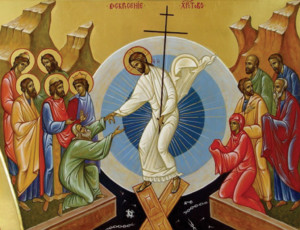Why does the date for Pascha (Easter) change every year?

The Christian feast of Pascha (Easter) has its origins in the Hebrew feast of the Passover, in which the Jews commemorate the deliverance of their ancestors from slavery in Egypt. This connection is profound – not only did the events of Jesus’ crucifixion and resurrection happen around the time of the feast of the Jewish Passover, but the events of the original Passover are a prefigurement of Jesus’ death and resurrection. Just as the Jewish Passover celebrated freedom from worldly slavery, Jesus’ resurrection, the new Passover, celebrates the freedom from spiritual slavery, which is death.
In the early Church, different Christian communities celebrated Pascha on different days, but always in association with the Jewish Passover. The Passover is celebrated on a fixed date, on the 15th of Nisan (Nisan being the first month of the Jewish calendar). According to the Gospels, the Lord was crucified the day before the Passover, which that year was on a Saturday, and resurrected the day after the Passover. We remember the Scriptural accounts whereby Christ resurrected early in the morning on the first day of the week, which we now call Sunday, or in Greek, Kyriake (Κυριακή), which means “the Lord’s Day.”
The inconsistency across communities in the early Church as to when Pascha was celebrated was related to emphasis. Some communities celebrated on the 14th of Nisan, the day on which the Lord has crucified, to emphasise the Crucifixion. Other Churches celebrated Pascha on the
Sunday after the 14th of Nisan, emphasising the resurrection. There were other differences, based on different calendars being used by different Churches.
The issue was finally resolved at the First Ecumenical Council of Nicea in 325 AD. The Fathers of the Council decreed that Pascha was to be celebrated on the first Sunday after the first full moon after the spring equinox (the day where sunrise and sunset are 12 hours apart). They were to use the Alexandrian calendar to determine the spring equinox, and hence the date of Pascha. As both the date of the spring equinox and the date of the following full moon change from year to year, the date of Pascha also changes. The Orthodox Church continues to maintain this order.
Whilst the Orthodox Church has been very diligent in maintaining the decree of the First Ecumenical Council, it is just as important to remember that our living of the Paschal events goes beyond what is on the yearly calendar. The life in Christ is one ongoing death and resurrection: the death of the old, sinful, worldly, carnal self, and the resurrection of the new person in Christ. If we do not live this, then Pascha becomes just a set of customs and rituals. If we do live the daily crucifixion and resurrection, then each year, Pascha can become a transformative experience of identifying with and living out Christ’s salvific death and resurrection.
May Christ’s resurrection be such a transformative experience for us!
† Fr G. L.
Source: Lychnos April-May 2020
